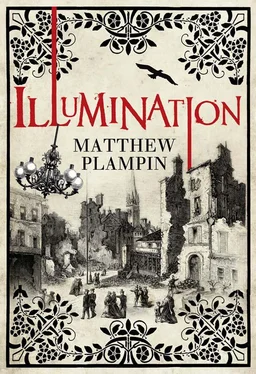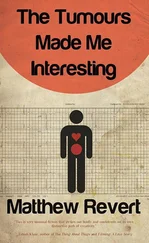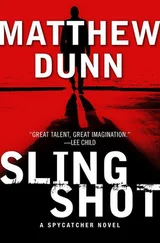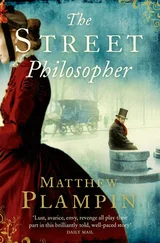Interest in the Pardy family dwindled, thankfully, the well-oiled artists moving onto discussion of their own siblings. Benoît had four sisters, it emerged, who insisted that he dine with them every week; whereas Lucien had a brother in Lille who he had not seen for more than a decade. Octave declined to contribute.
It proved a rather sobering topic. Lucien, seeking to reverse the tide, suggested another drink. Hannah glanced over at the mouth of the rue Saint-André, aware that she should extricate her brother from the Danton – and that she wasn’t going to. The risk of encountering Elizabeth was too great. It wasn’t as if Clement was actually in danger , after all; he was a grown man now, surely capable of fending off a hard-bitten Parisian tart. Like many ashamed by their selfishness, Hannah sought solace in swearing later action: I will write to him in London, she vowed, the letter I never wrote him when I first fled – a long letter that will explain everything. I will write to him as soon as this war is done with and our new lives have begun.
‘Somewhere downhill,’ she said, starting to walk. ‘On the boulevards.’
The knocks shook the shed, rattling the paintbrushes in their jars and sending the Japanese screen toppling to the floorboards. Hannah woke; she was curled up on an old wicker chair, fully clothed, off in a shadowy corner. The morning was full-blown, lines of sunlight slicing between the slats of the warped window-shutter. Gingerly, she eased her stiff legs around and set about untangling her boots from the hem of her dress. Down in the city a bugle sounded, distant and mechanical, playing out its call and running through an immaculate repetition.
The second round of knocks, even louder than the first, dragged Hannah from the chair into the middle of the room. Staring at the door, she imagined the person who was surely on the other side: head cocked, hair and hat just so, listening intently for any movement within. The moment had arrived. Elizabeth Pardy had come back to the rue Garreau.
Returning home in the blue gloom of two o’clock, filled with cheap wine and belligerence, Hannah had actually been disappointed to find the shed empty. She’d decided to stay awake and wait. Elizabeth had journeyed all the way from St John’s Wood; she would never admit defeat so easily. Hannah had lit her lamp and scoured the shed for any sign of her mother’s earlier inspection. None could be found, not even a whiff of face powder, yet everything had seemed altered somehow – diminished by her scrutiny. The shed had looked smaller, dirtier, more wretched; the paintings inadequate, dull, lacking a critical element. Hannah had barely managed to prevent herself from taking up her canvas knife and scraping them clean.
Instead, she’d attempted to amend a scene of the midday crowds promenading on the Quai de la Conférence, to put in what was missing. Luckily, next to nothing had actually been done; but she’d been drunk enough to forget her smock, and as a result there was paint smeared on her sleeves and front. In the pocket of her dress, also, was a flat-headed brush, one of her best, its bristles encased in a hard clot of yellow pigment. She’d plainly sat down to assess what she was going to do and stumbled immediately into sleep. There wasn’t any money to replace this brush. Cursing her stupidity, she started to pick at the dried paint with her thumbnail.
The third salvo was impatient, with emphatic pauses left between each knock. Hannah consigned the ruined brush to a jug of soft-soap. Her will to fight was utterly gone; her eyes were raw, and her head ached a little more with each movement she made. She wondered if she could hide, pretend to be elsewhere – or perhaps slip out of the window.
‘It’s me,’ said Jean-Jacques. ‘Open the door.’
Hannah snapped back the bolt and he rushed in on a gust of fresh, cold air; his kiss was hungry and tasted of strong coffee and aniseed. A hot, unthinking joy flooded through her, washing away her tiredness and her pain, fizzing in her toes and fingertips. She kissed him again, more passionately, trying to unbutton his jacket; but he moved around her and carried on into the room.
It was obvious that Jean-Jacques hadn’t been to bed and didn’t intend to now. Some of his usual self-possession was absent, lost in exhilaration. A lock of black hair had escaped his hat, curving across his brow – connecting, almost, with the line of the scar on the cheek below. He went towards the mattress and reached for the black coat he’d left hanging on the wall.
Hannah watched him search through its pockets – and realised that her mother and brother were sure to have seen this coat when Madame Lantier showed them the shed the night before. She recalled the speed and certainty with which Clem had identified Jean-Jacques in the Danton. They’d worked it out. They knew everything. She shut the door; so let them know, she thought. Let them form whatever conclusions they please. How can it possibly matter now?
Jean-Jacques had taken a small notebook from the coat and was attempting to make an entry inside. Writing posed a steep physical challenge for him. The hand within his right glove was a mottled, broken thing, missing both the index and middle fingers, torn to pieces several years ago and clumsily reassembled. He’d told Hannah that this terrible injury had been inflicted at the same time as the slash to his cheek, while he’d been fighting in America against the Southern Confederacy. Assisted by the wooden digits sewn into his glove, he’d managed to develop a scrawl that was just about legible. That morning, however, his distraction proved too much; he’d dropped his pencil before a single word was complete. Kneading the crippled hand, he asked for her assistance.
Hannah gave it gladly. Jean-Jacques dictated a list of names, dates and directives, rapidly covering three pages. It felt unexpectedly intimate. He was trusting her with the ultras’ secrets, their plans, the lifeblood of their campaign; whereas she hadn’t even been able to reveal the most basic facts of her life before Paris, leaving him to discover them by accident the previous evening. Hannah longed to explain how badly she’d needed to flee from London – to shake off her tired role as the oppressed daughter and begin again – but she knew that this would have to wait. She closed the notebook and handed it back.
‘What’s happening?’
Jean-Jacques put it in his jacket. ‘The army is marching from their camps in the centre of the city. They’re going beyond the wall – to engage Prussian advance forces to the south.’ His attempt at a businesslike bearing failed; he hugged her, another tight, three-second clasp, and then held her out at arm’s length. A thin ribbon of light wound over his face, striping his irises with crimson. ‘It is starting, Hannah, at long last. The fight is finally starting.’
Hannah swallowed; when she spoke, her voice sounded hoarse and heavy, as if it belonged to someone far older. ‘What – what are we to do?’
Jean-Jacques let her go. ‘We must gather everyone,’ he said. ‘ Everyone . We must march on the boulevards and show our numbers – our willingness to meet our enemies in battle. We must show that we are ready.’
He walked to the shed door and pulled it open. Dazed by what he proposed, by what he was already putting into action, Hannah didn’t move; several seconds passed and she heard him ask, ‘ Are you ready, Hannah?’
She grabbed a cloth from an easel and tried to wipe the paint from her fingers. ‘I am,’ she lied. ‘I was about to leave myself, actually, for the place Saint-Pierre. I only took so long to open the door because I thought you might be my wretched mother, come to deliver the lecture I denied her last night.’ She smiled at her own foolishness. ‘But she’ll be on a train by now, halfway to Calais – a hundred miles from here.’
Читать дальше












